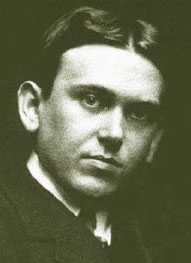H. L. Mencken Quotes
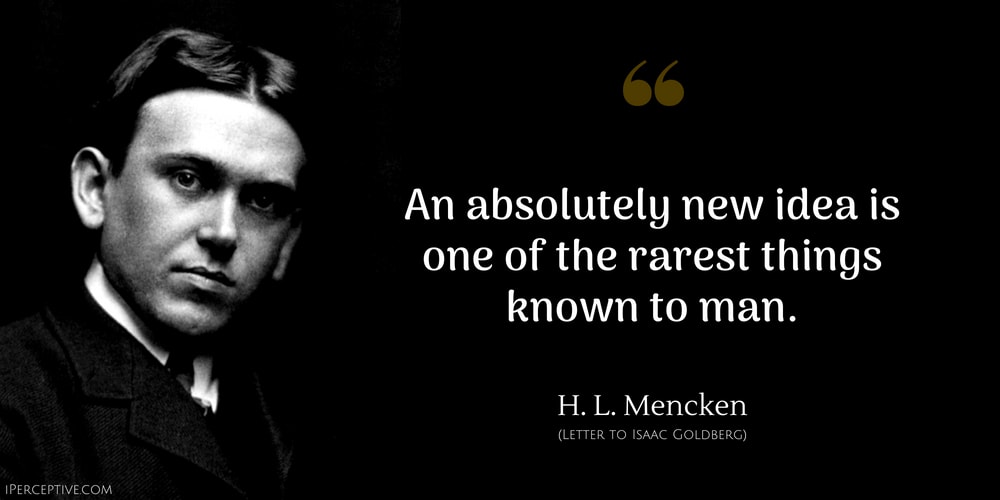
An absolutely new idea is one of the rarest things known to man.
The older I grow the more I distrust the familiar doctrine that age brings wisdom.
The truth, indeed, is something that mankind, for some mysterious reason, instinctively dislikes. Every man who tries to tell it is unpopular, and even when, by the sheer strength of his case, he prevails, he is put down as a scoundrel.
The average man doesn't want to be free. He wants to be safe.
Truth would quickly cease to be stranger than fiction, once we got as used to it.
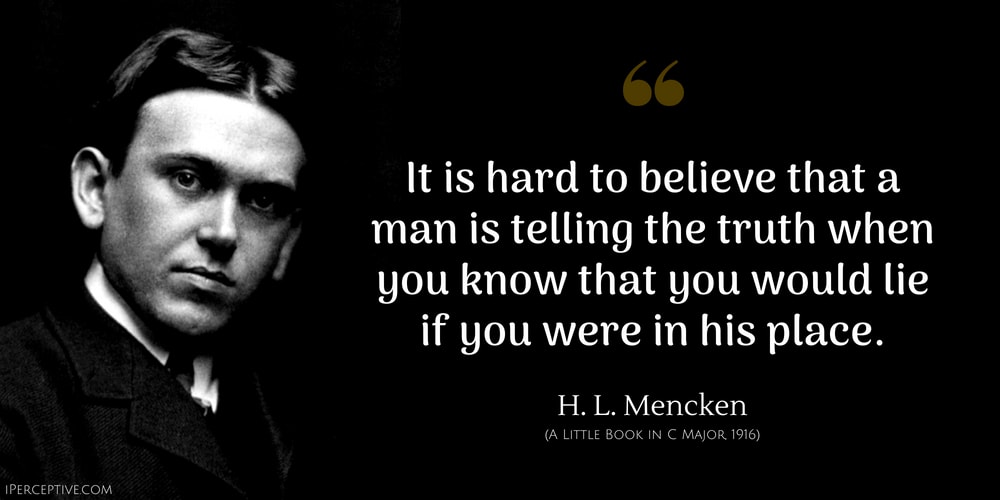
It is hard to believe that a man is telling the truth when you know that you would lie if you were in his place.
Nature abhors a moron.
Faith may be defined briefly as an illogical belief in the occurrence of the improbable.
The most costly of all follies is to believe passionately in the palpably not true. It is the chief occupation of mankind.
No government as such is ever in favor of the freedom of the individual. It invariably seeks to limit that freedom, if not by overt denial, then by seeking constantly to widen its own functions.
The basic fact about human existence is not that it is a tragedy, but that it is a bore. It is not so much a war as an endless standing in line. The objection to it is not that it is predominantly painful, but that it is lacking in sense.
I do not believe in education, and am glad I never went to a university. Beyond the rudiments, it is impossible to teach anything. All the rest the student acquires himself. His teacher merely makes it difficult for him. I never learned anything in school.
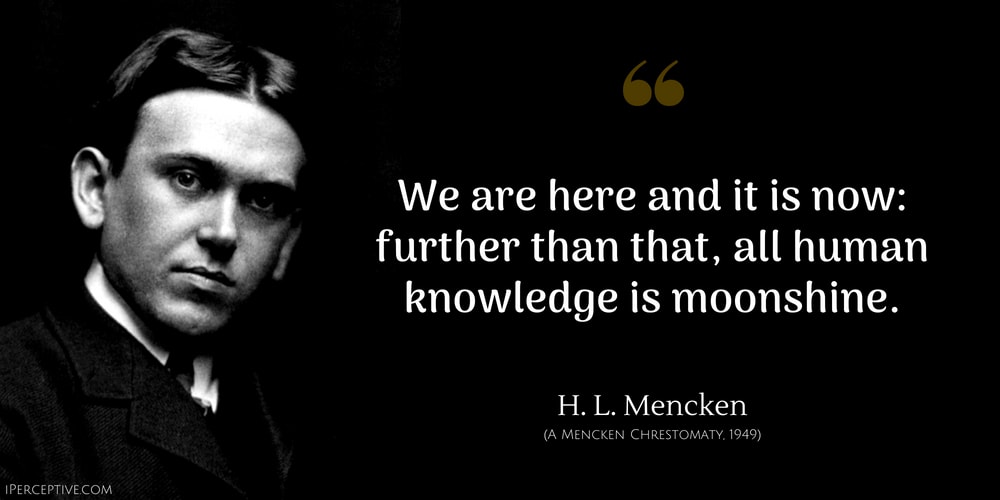
We are here and it is now: further than that, all human knowledge is moonshine.
The curse of man, and cause of nearly all of his woes, is his stupendous capacity for believing the incredible.
A good politician is quite as unthinkable as an honest burglar.
Every normal man must be tempted, at times, to spit upon his hands, hoist the black flag, and begin slitting throats.
All government, in its essence, is a conspiracy against the superior man: its one permanent object is to oppress him and cripple him... The most dangerous man to any government is the man who is able to think things out for himself, without regard to the prevailing superstitions and taboos.
The intellectual heritage of the race belongs to the minority, and to the minority only. The majority has no more to do with it than it has to do with ecclesiastic politics on Mars.
The priest, realistically considered, is the most immoral of men, for he is always willing to sacrifice every other sort of good to the one good of his arcanum - the vague body of mysteries that he calls the truth.
If we assume that man actually does resemble God, then we are forced into the impossible theory that God is a coward, an idiot, and a bounder.
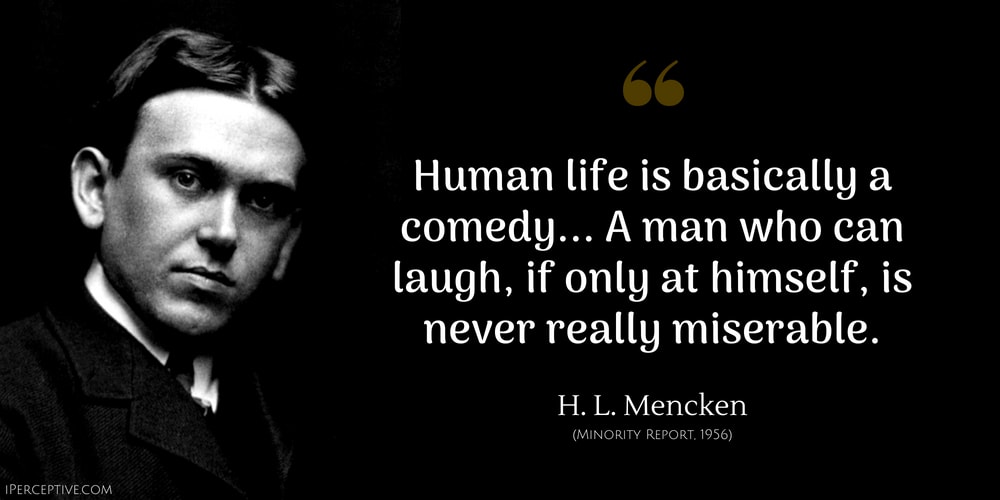
Human life is basically a comedy... A man who can laugh, if only at himself, is never really miserable.
Conscience is the inner voice that warns us somebody may be looking.
To sum up:
1. The cosmos is a gigantic fly-wheel making 10,000 revolutions a minute.
2. Man is a sick fly taking a dizzy ride on it.
3. Religion is the theory that the wheel was designed and set spinning to give him the ride.
Religion, like poetry, is simply a concerted effort to deny the most obvious realities.
People will believe what they want to believe.
The effort to reconcile science and religion is almost always made, not by theologians, but by scientists unable to shake off altogether the piety absorbed with their mother's milk.
Christian: One who is willing to serve three Gods, but draws the line at one wife.
Religion is fundamentally opposed to everything I hold in veneration - courage, clear thinking, honesty, fairness, and, above all, love of the truth.
Women decide the larger questions of life correctly and quickly, not because they are lucky guessers, not because they are divinely inspired, not because they practise a magic inherited from savagery, but simply and solely because they have sense. They see at a glance whay most men could not see with searchlights and telescopes... They are the supreme realists of the race.
All professional politicians are dedicated wholeheartedly to waste and corruption. They are the enemies of every decent man.
The fact that I have no remedy for all the sorrows of the world is no reason for my accepting yours. It simply supports the strong probability that yours is a fake.
It is the dull man who is always sure, and the sure man who is always dull.
The older I get the more I am convinced that, if I am ever to do anything worth a damn, it must be done entirely alone. Moreover, I am more comfortable that way.
The ideal way to get rid of any infectious disease would be to shoot instantly every person who comes down with it.
It takes a long while for a naturally trustful person to reconcile himself to the idea that after all God will not help him.
The human race is in such a dreadful state that no rational person can talk about it without resorting to seditious and obscene language.
It was morality that burned the books of the ancient sages, and morality that halted the free inquiry of the Golden Age and substituted for it the credulous imbecility of the Age of Faith. It was a fixed moral code and a fixed theology which robbed the human race of a thousand years by wasting them upon alchemy, heretic-burning, witchcraft and sacerdotalism.
I believe that nothing is unconditionally true, and hence I am opposed to every statement of positive truth and to every man who states it. Such men seem to me to be idiots or scoundrels.
Equality before the law is probably forever inattainable. It is a noble ideal, but it can never be realized, for what men value in this world is not rights but privileges.
Any man who afflicts the human race with ideas must be prepared to see them misunderstood.
A fool who, after plain warning, persists in dosing himself with dangerous drugs should be free to do so, for his death is a benefit to the race in general.
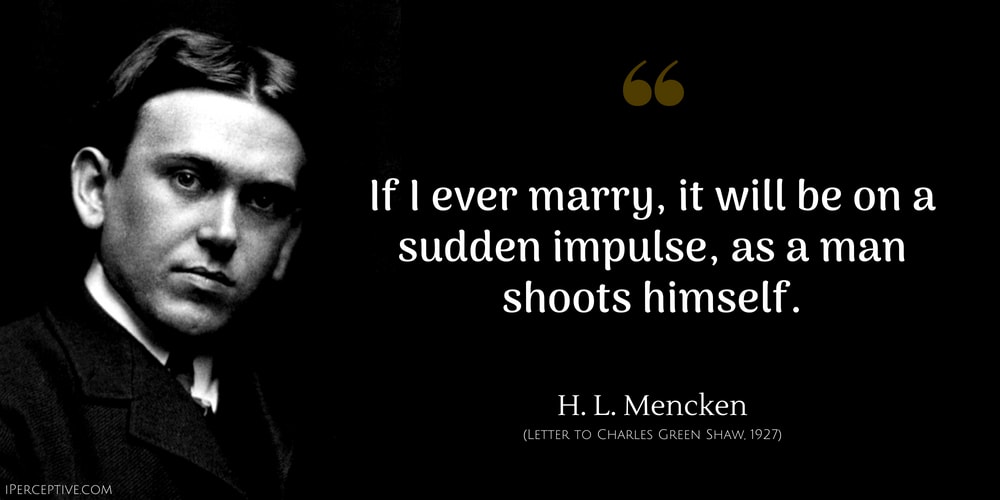
If I ever marry, it will be on a sudden impulse, as a man shoots himself.
The fundamentalist mind, running in a single rut for fifty years, is now quite unable to comprehend dissent from its basic superstitions, or to grant any common honesty, or even any decency, to those who reject them.
Moral certainty is always a sign of cultural inferiority. The more uncivilized the man, the surer he is that he knows precisely what is right and what is wrong. All human progress, even in morals, has been the work of men who have doubted the current moral values, not of men who have whooped them up and tried to enforce them. The truly civilized man is always skeptical and tolerant.
Creator: A comedian whose audience is afraid to laugh.
To wage a war for a purely moral reason is as absurd as to ravish a woman for a purely moral reason.
Of all escape mechanisms, death is the most efficient.
Metaphysics is almost always an attempt to prove the incredible by an appeal to the unintelligible.
It is Hell, of course, that makes priests powerful, not Heaven, for after thousands of years of so-called civilization fear remains the one common denominator of mankind.
Nine times out of ten, in the arts as in life, there is actually no truth to be discovered; there is only error to be exposed.
In the present case it is a little inaccurate to say I hate everything. I am strongly in favor of common sense, common honesty and common decency. This makes me forever ineligible to any public office of trust or profit in the Republic.
So long as there are men in the world, 99 percent of them will be idiots, and so long as 99 percent of them are idiots they will thirst for religion, and so long as they thirst for religion, it will remain a weapon over them. I see no way out. If you blow up one specific faith, they will embrace another.
To the man with an ear for verbal delicacies - the man who searches painfully for the perfect word, and puts the way of saying a thing above the thing said - there is in writing the constant joy of sudden discovery, of happy accident.
After all, all he did was string together a lot of old, well-known quotations.
When I die I shall be content to vanish into nothingness.... No show, however good, could conceivably be good forever.... I do not believe in immortality, and have no desire for it.
Say what you like about the Ten Commandments, you must always come back to the pleasant fact that there are only ten of them.
Men become civilized, not in proportion to their willingness to believe, but in proportion to their readiness to doubt.
What I admire most in any man is a serene spirit, a steady freedom from moral indignation, an all-embracing tolerance... when he fights he fights in the manner of a gentleman fighting a duel, not in that of a longshoreman cleaning out a waterfront saloon. That is to say, he carefully guards his amour-prope by assuming that his opponent is as decent a man as he is, and just as honest - and perhaps, after all, right.
I believe in only one thing and that thing is human liberty. If ever a man is to achieve anything like dignity, it can happen only if superior men are given absolute freedom to think what they want to think and say what they want to say. I am against any man and any organization which seeks to limit or deny that freedom. . . [and] the superior man can be sure of freedom only if it is given to all men.
Laws are no longer made by a rational process of public discussion; they are made by a process of blackmail and intimidation, and they are executed in the same manner.
God is the immemorial refuge of the incompetent, the helpless, the miserable. They find not only sanctuary in His arms, but also a kind of superiority, soothing to their macerated egos: He will set them above their betters.
The inferior man's reasons for hating knowledge are not hard to discern. He hates it because it is complex - because it puts an unbearable burden upon his meager capacity for taking in ideas. Thus his search is always for short cuts. Their aim is to make the unintelligible simple, and even obvious.
Every contribution to human progress on record has been made by some individual who differed sharply from the general, and was thus, almost , superior to the general. Perhaps the palpably insane must be excepted here, but I can think of no others. Such exceptional individuals should be permitted, it seems to me, to enjoy every advantage that goes with their superiority.... The rest are as negligible as the race of cockroaches, who have gone unchanged for a million years.
To me the scientific point of view is completely satisfying, and it has been so as long as I can remember. Not once in this life have I ever been inclined to seek a rock and a refuge elsewhere. It leaves a good many dark spots in the universe, to be sure, but not a hundredth time as many as theology. We may trust it, soon or late, to throw light upon many of them, and those that remain dark will be beyond illumination by any other agency. It also fails on occasion to console, but so does theology...
The fact is that the average man's love of liberty is nine-tenths imaginary, exactly like his love of sense, justice and truth. He is not actually happy when free; he is uncomfortable, a bit alarmed, and intolerably lonely. Liberty is not a thing for the great masses of men. It is the exclusive possession of a small and disreputable minority, like knowledge, courage and honor. It takes a special sort of man to understand and enjoy liberty - and he is usually an outlaw in democratic societies.
The truth is that Christian theology, like every other theology, is not only opposed to the scientific spirit; it is also opposed to all other attempts at rational thinking. Not by accident does Genesis 3 make the father of knowledge a serpent - slimy, sneaking and abominable. Since the earliest days the church, as an organization, has thrown itself violently against every effort to liberate the body and mind of man. It has been, at all times and everywhere, the habitual and incorrigible defender of bad governments, bad laws, bad social theories, bad institutions. It was, for centuries, an apologist for slavery, as it was the apologist for the divine right of kings.
The meaning of religious freedom, I fear, is sometimes greatly misapprehended. It is taken to be a sort of immunity, not merely from governmental control but also from public opinion. A dunderhead gets himself a long-tailed coat, rises behind the sacred desk and emits such bilge as would gag a Hottentot. Is it to pass unchallenged? If so, then what we have is not religious freedom at all, but the most intolerable and outrageous variety of religious despotism. Any fool, once he is admitted to holy orders, becomes infallible. Any half-wit, by the simple device of ascribing his delusions to revelation, takes on an authority that is denied to all the rest of us.
The scientific impulse seems to me to be the very opposite of the religious impulse. When a man seeks knowledge he is trying to gain means of fighting his own way in the world, but when he prays he confesses that he is unable to do so. .... The feeling of abasement, of incapacity, is inseparable from the religious impulse, but against that feeling all exact knowledge makes war. The efficient man does not cry out "Save me, O God". On the contrary, he makes diligent efforts to save himself. But suppose he fails? Doesn't he throw himself, in the end, on the mercy of the gods? Not at all. He accepts his fate with philosophy, buoyed up by the consciousness that he has done his best. Irreligion, in a word, teaches men how to die with dignity, just as it teaches them how to live with dignity.
That Negroes, in more than one way, are superior to most American whites is something that I have long believed. I pass over their gift for music (which is largely imaginary) and their greater dignity (which Dr. Eleanor R. Wembridge has described more eloquently than I could do it), and point to their better behavior as members of our common society. Are they, on the lower levels, somewhat turbulent and inclined to petty crime? Perhaps. But that crime is seldom anti-social. It gets a lot of advertising when it is, but that is not often. Professional criminals are rare among Negroes, and, what is more important, professional reformers are still rarer. The horrible appetite of the low-caste Anglo-Saxon to police and harass his fellow-men is practically non-existent among them. No one ever hears of Negro wowsers inventing new categories of crime, and proposing to jail thousands of their own people for committing them. Negro Prohibitionists are almost as rare as Catholic Prohibitionists. No Negro has ever got a name by pretending to be more virtuous than the rest of us. In brief, the race is marked by extraordinary decency.
The way to deal with superstition is not to be polite to it, but to tackle it with all arms, and so rout it, cripple it, and make it forever infamous and ridiculous. Is it, perchance, cherished by persons who should know better? Then their folly should be brought out into the light of day, and exhibited there in all its hideousness until they flee from it, hiding their heads in shame.
True enough, even a superstitious man has certain inalienable rights. He has a right to harbor and indulge his imbecilities as long as he pleases, provided only he does not try to inflict them upon other men by force. He has a right to argue for them as eloquently as he can, in season and out of season. He has a right to teach them to his children. But certainly he has no right to be protected against the free criticism of those who do not hold them. He has no right to demand that they be treated as sacred. He has no right to preach them without challenge. Did Darrow, in the course of his dreadful bombardment of Bryan, drop a few shells, incidentally, into measurably cleaner camps? Then let the garrisons of those camps look to their defenses. They are free to shoot back. But they can't disarm their enemy.
I believe that religion, generally speaking, has been a curse to mankind - that its modest and greatly overestimated services on the ethical side have been more than overcome by the damage it has done to clear and honest thinking.
I believe that no discovery of fact, however trivial, can be wholly useless to the race, and that no trumpeting of falsehood, however virtuous in intent, can be anything but vicious.
I believe that all government is evil, in that all government must necessarily make war upon liberty and the democratic form is as bad as any of the other forms.
I believe that the evidence for immortality is no better than the evidence of witches, and deserves no more respect.
I believe in the complete freedom of thought and speech — alike for the humblest man and the mightiest, and in the utmost freedom of conduct that is consistent with living in organized society.
I believe in the capacity of man to conquer his world, and to find out what it is made of, and how it is run.
I believe in the reality of progress.
I, But the whole thing, after all, may be put very simply. I believe that it is better to tell the truth than to lie. I believe that it is better to be free than to be a slave. And I believe that it is better to know than be ignorant.

